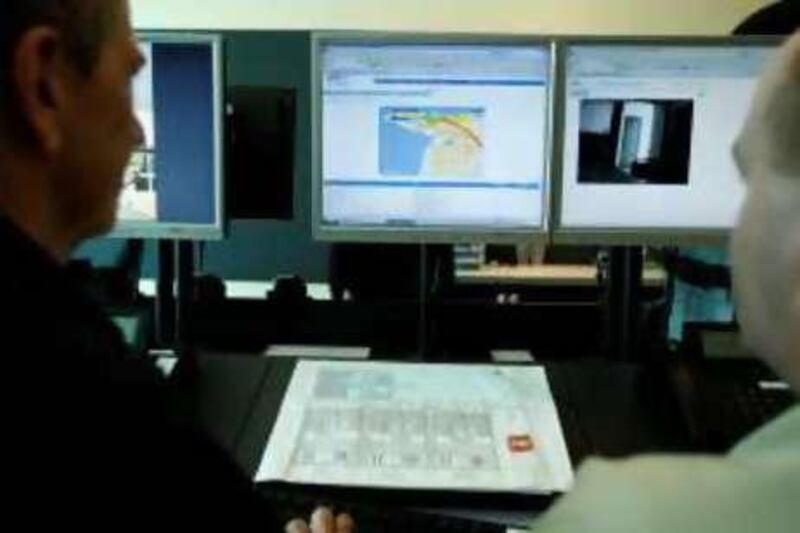ABU DHABI // A former FBI agent and an ex-British Army soldier have created a control centre that can track and monitor school buses charged with keeping children safe. From a command post in Khalifa City A, operators can view the location of vehicles throughout the UAE and slow and even stop drivers. The safety of school bus operations came under scrutiny following the death in April of a boy, aged three, after he was left on board a school bus.
Adsecc, the company operating the monitoring programme, is one of at least three firms in the UAE offering vehicle tracking technology. "The driver knows he is being monitored, so he is going to drive a bit slower," said Charles Mallice, a former soldier and Adsecc's director of operations and training. "It can be controlled so that if the guy does drive a bit fast, you can slow him down. "You can cut fuel so it doesn't get through as fast, even stopping the vehicle. It can be done from here or from a PDA [personal digital assistant]."
The technology extends beyond monitoring school buses, as it can also be used to check routes used by delivery men or determine where salespeople have been and for how long. Owners can also be alerted if their vehicles are taken outside designated areas. Users would pay an initial fee of Dh2,500 (US$680) and a monthly charge of Dh100. Rental packages are also available. Several commercial delivery companies have already joined the initiative.
Steven Polifko, Adsecc's director of administration and development and a retired FBI agent, said the technology was "a way around" the UAE's poor road safety standards. "It is a multicultural environment, and people have different driving habits and that's part of the problem," he said. "You have to look at a solution." Monitoring a vehicle's location could come in useful if the unforeseen happened, Mr Polifko said.
"If an accident happened, we would immediately know where it took place and we could co-ordinate with the emergency team." Vehicles are monitored with global positioning satellite technology, and location information is sent to the 16-screen control centre or the vehicle owner using radio. Information is relayed at predetermined intervals, such as every five minutes, but speed is monitored constantly and if it goes above agreed limits, or the vehicle breaches other rules, an alert is sent by text message or email.
A standard internet web browser is all that is needed to see the vehicle's position on a map, right down to its location on a particular street. Cameras could be installed inside school buses to allow parents, through the internet, to check on their children. All information is recorded and checked at the end of the day. Charbel Kassas, the general manager of GPD Technology, an Italian firm that supplies the tracking technology, said: "If a salesman went to a coffee shop with his girlfriend, it would show at the end of the day in his report. This is not to invade their privacy; it's to enhance their work."
As well as speed, variables such as the vehicle's oil pressure and water temperature can be monitored and problems such as fuel shortages identified. If the car is stolen, the system can inform the owner or control centre staff of its location and the vehicle can be disabled. Different maximum speeds can be imposed for different roads and limits on where the vehicle is allowed to travel can also be applied, with the system sending out warning text messages or emails if the vehicle goes outside an agreed area.
With commercial vehicles that contain refrigerators, sensors can determine the temperature and alerts can be sent if it gets too hot or cold. Adsecc, which was founded last year, recently completed testing of the system. @Email:dbardsley@thenational.ae







